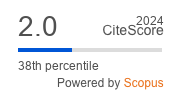The Correlation between Enrolment Criteria and Students’ Success in the Study of Medicine: a Five-Year Retrospective Study
DOI:
https://doi.org/10.5644/ama2006-124.280Keywords:
Enrolment, State Graduation Exam, Students’ Study-SuccessAbstract
Objective. To investigate whether the students’ study-success correlates with the achievements evaluated in the enrolment process based on the State Graduation Exam.
Methods. The retrospective study included a total of 637 students enrolled in the study of Medicine at the Faculty of Medicine from the academic year 2010-11 to 2014-15. We analysed the structure of students enrolled on the basis of the State Graduation Exam, examined their success in two courses of the study programme and then correlated this study-success with individual admission parameters. In particular, we investigated whether the success in the study was influenced by the changes made in the enrolment requirements during this period. Pearson’s correlation coefficient was used to measure strenght of correlation between two variables.
Results. The changes in the admission parameters, i.e., the inclusion of STEM subjects as obligatory enrolment requirements, made in 2012-13 enabled a better selection of students with
high average secondary education grades and with significantly better results in Biology, Physics and particularly in Chemistry. This resulted in a higher success in the study, especially in the last two new-criteria generations. The Pearson correlation coefficient between students’ success in Physiology and Pathophysiology II and the achievements valuated in enrolment procedure as total cumulative score were statistically significant (r=0.27, P<0.001). Total points achieved in enrolment procedure was also correlated with students’ success in Medical Physics and Biophysics and correlation was even stronger (r = 0.52, P<0.001).
Conclusion. Our results proved that a well-designed combination of the relevant admission parameters is a crucial prerequisite for a better success in the study.
Downloads
Published
Issue
Section
License
Copyright (c) 2020 Jagoda Ravlić-Gulan, Gordana Žauhar

This work is licensed under a Creative Commons Attribution-NonCommercial 4.0 International License.





